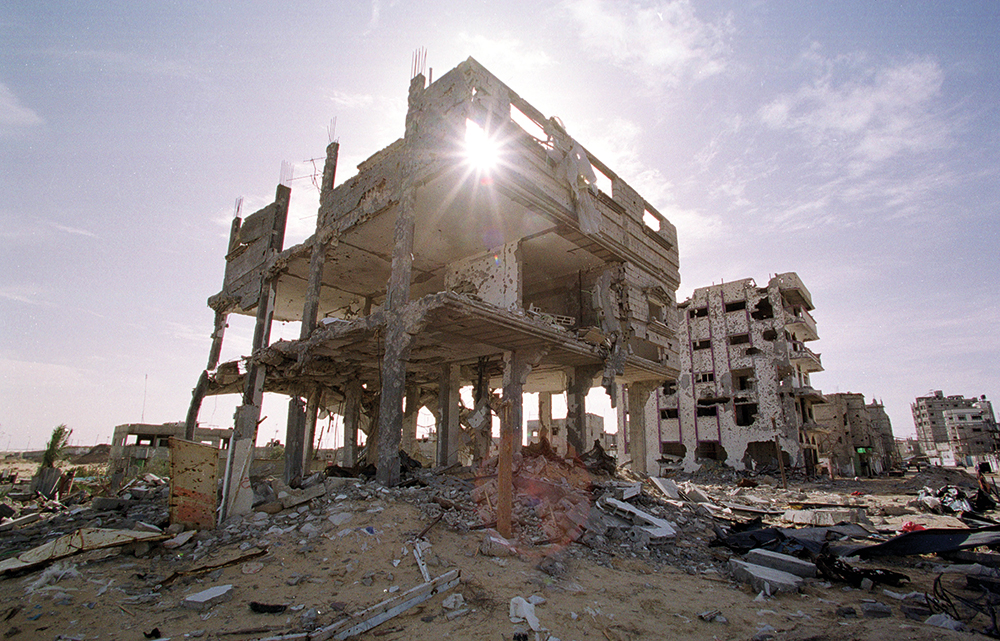
Marc Lynch is angry. The word ‘rage’ appears six times on the first page, and comes in response to Israel’s war in Gaza. This should be sufficient warning to anyone expecting a cool, calm, dispassionate analysis of the Middle East that they might have picked up the wrong book. That is not to say that Lynch, who runs the George Washington University’s Middle East programme, is not worth reading. On the contrary, and despite the occasional lapse into the sort of political-science-speak favoured by academics, he is a fierce and compelling voice.
Lynch dates the beginning of America’s Middle East to 1991, the conclusion of a swift military campaign against Saddam Hussein’s Iraq and the end of the bipolar era in which the US and the Soviet Union had for decades shared the responsibilities of international mediation. Contrast the hopes for the region then – Israeli-Palestinian peace, the spread of democracy and liberalising economic reforms – with the reality of what followed: multiple wars between Israel, Hamas and Hezbollah; another war and a decade-long insurgency in Iraq; civil wars in Syria, Yemen, Libya and Sudan; and continued internal repression by regimes that can be classified as autocracies, if you are being kind, or varying shades of dictatorship if you’re feeling less charitable.
Both Israel and the United States come in for a vigorous kicking, more so than the region’s Islamists, Hamas foremost among them. This is a pity, as well as a mistake, because it undermines a wider analysis of American policy towards the Middle East that is otherwise brave, bracing and original.
It is Washington’s complicity with Arab autocracy combined with the impunity it allows Israel, irrespective of whether Republicans or Democrats are in government, which infuriates Lynch. And much of the rest of the world, too. The author is unsparing in his critique. The US, he writes, consistently likes to present itself as ‘seeking to liberate the people they are immiserating’. Washington’s inability or refusal to take regional public opinion seriously has long been its ‘fatal flaw’. ‘The starting premise of American policy has always implicitly been that Palestinians are not fully human beings.’
As an avowed Obama fan who advised both presidential campaigns, he cuts the former president a lot of slack, though the title of this chapter, adapted from Obama’s memoir, gives the game away: ‘The Audacity, and Failure, of Hope.’ Given Obama’s much vaunted hopes of changing both American policy in the region and the mindset behind it, the charge sheet against him makes depressing reading: a free pass to Gulf forces to help Bahrain’s monarchy crush its Arab Spring uprising in 2011; failure to uphold his ‘red line’ in 2012 over Syrian president Bashar al Assad’s use of chemical weapons against his own people; the refusal to brand the 2013 Saudi- and UAE-backed rising against the democratically elected Muslim Brotherhood government in Egypt a coup. In the words of a 2016 Brookings report, not quoted by Lynch, ‘when it comes to Israeli-Palestinian peacemaking, no US president has promised more and accomplished less than Obama’.
The younger generation of
Americans are considerably more pro-Palestininan than their parents
The years ahead, Lynch argues, should cause concern for Israelis. The younger generation of Americans, who do not have political memories extending to Israel’s foundation in 1948, are considerably more pro-Palestinian than their parents. When the US finds itself alone, again and again, wielding its Security Council veto in defence of Israel, that demographic shift should ring alarm bells in Jerusalem and Washington. Likewise, as Lynch observes, for decades the bipartisan consensus in the US on Israel barely needed to be openly defended. Today it is under active discussion at every level.
There is a reason that Benjamin Netanyahu refuses to discuss ‘the day after’ the war in Gaza has ended. We know that it does not involve the beginning of talks with the Palestinians leading to a two-state solution, because he has ruled out a Palestinian state. In many minds, the obvious alternative, a single state, will be tantamount to apartheid. Lynch notes that the quartet composed of Human Rights Watch, Amnesty International, the Israeli human rights organisation B’Tselem and the International Court of Justice considers ‘the international legal criteria for the crime of apartheid’ to have been met already.
On 16 September, a UN report accused Israel of committing genocide, adding to the country’s deepening international isolation days ahead of the planned recognition by a handful of countries, including the UK, France, Canada and Australia, of the state of Palestine at the UN’s General Assembly.
What comes after Gaza? Like many experts, Lynch has already written off the two-state solution and reckons ‘an unsustainable apartheid may be a surer route towards the attainment of Palestinian rights than the perpetual pretence of the fantasy of two states’. To quote the title of the Egyptian-American writer Omar El Akkad’s excoriating book on the West’s complicity in the horrors of Gaza, One Day Everyone Will Have Always Been Against This.








Comments